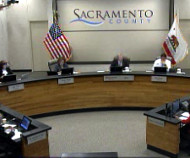Article from: www.thenewspaper.com/news/67/6769.asp
8/9/2019
Sacramento, California Reveals Red Light Camera Chaos
Sacramento County, California, revealed red light cameras have been off for eight months while trying to rekindle ticketing deal with Redflex.
 Officials in Sacramento County, California, did their best to conceal the red light camera program's failure from the public. The automated ticketing machines went dark in January and have not issued a citation since. News of what happened was kept under wraps until a notice for a board of supervisors meeting on Tuesday revealed a quiet plan to restart the program with the scandal-plagued Australian camera operator Redflex Traffic Systems following the firing of the previous contractor, Conduent.
Officials in Sacramento County, California, did their best to conceal the red light camera program's failure from the public. The automated ticketing machines went dark in January and have not issued a citation since. News of what happened was kept under wraps until a notice for a board of supervisors meeting on Tuesday revealed a quiet plan to restart the program with the scandal-plagued Australian camera operator Redflex Traffic Systems following the firing of the previous contractor, Conduent.
"It's odd that there's not much in the way of an explanation about why the vendor Conduent couldn't perform and did not perform," supervisor Phil Sema said on Tuesday. "Was there something that prevented the contractor from starting on time? We don't know any of that... I don't feel like I can make an informed decision."
While all of the supervisors spoke in favor of red light cameras, they were upset that, instead of generating profit, the devices were accumulating thousands in costs while idle. The ticketing stopped when, after five years with Redflex, the county decided to switch over to Conduent this January.
Conduent should have been able to handle the program, considering the company was the county's original contractor back in 2000 (then operating under the name Affiliated Computer Services). Throughout the year, however, the company failed to meet deadlines and ended up failing to install any cameras at all. The county terminated the contract for cause in May, leaving city staff with the idea of giving the job back to Redflex, with the Australian firm looking to pocket $1.8 million out of the $16.4 million worth of tickets the company is expected to generate under the new two-year deal.
A member of the public advised the supervisors that California law requires a public meeting to be held before "authorizing the city or county to enter into a contract" for red light camera use. Although the city attorney insisted that putting the matter on the board's consent agenda was good enough, the board voted 4 to 1 to put off the decision until the next meeting on August 20.
The vast majority of cities that have experimented with red light cameras in the Golden State have since decided to drop them. The list includes Belmont, Bell Gardens, Berkeley, Burlingame, Cerritos, Compton, Corona, Costa Mesa, Cupertino, El Cajon, Davis, El Monte, Escondido, Emeryville, Fairfield, Fresno, Fullerton, Gardena, Glendale, Grand Terrace, Hayward, Highland, Indian Wells, Irvine, Laguna Woods, Lancaster, Loma Linda, Los Angeles, Long Beach, Marysville, Maywood, Menlo Park Montclair, Moreno Valley, Napa, Oakland, Paramount, Pasadena, Poway, Rancho Cucamonga, Redlands, Redwood City, Rocklin, Roseville, Rowland Heights, San Bernardino, San Carlos, San Diego, San Jose (photo radar), San Juan Capistrano, Santa Fe Springs, Santa Maria, San Mateo, Santa Rosa, South Gate, Stockton, Union City, Upland, Vista, Walnut, Whittier, Yuba City and Yucaipa. The city councils of Laguna Niguel and Orange passed ordinances banning cameras in 2011. Residents of Anaheim, Murrieta and Newport Beach voted to ban red light cameras at the ballot box.
 Officials in Sacramento County, California, did their best to conceal the red light camera program's failure from the public. The automated ticketing machines went dark in January and have not issued a citation since. News of what happened was kept under wraps until a notice for a board of supervisors meeting on Tuesday revealed a quiet plan to restart the program with the scandal-plagued Australian camera operator Redflex Traffic Systems following the firing of the previous contractor, Conduent.
Officials in Sacramento County, California, did their best to conceal the red light camera program's failure from the public. The automated ticketing machines went dark in January and have not issued a citation since. News of what happened was kept under wraps until a notice for a board of supervisors meeting on Tuesday revealed a quiet plan to restart the program with the scandal-plagued Australian camera operator Redflex Traffic Systems following the firing of the previous contractor, Conduent.